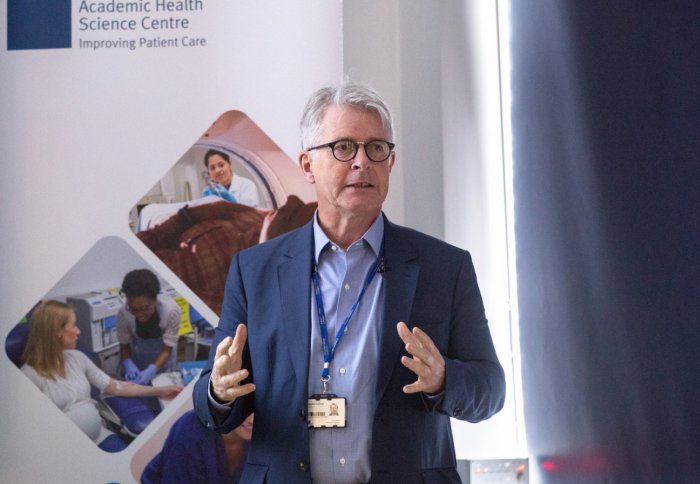Experts explain the potential for new cancer drugs and treatments

Cancer drugs being developed at Imperial could offer a new way to treat the disease, say researchers.
Imperial scientists presented their results at the latest Imperial College Academic Health Science Centre (AHSC) seminar series event.
Professor Ed Tate, Professor of Chemical Biology at Imperial College London and Professor Charles Coombes, Consultant Medical Oncologist at Imperial College Healthcare NHS Trust, explained the significance of their findings to staff and academics at Charing Cross Hospital.
Professor Coombes discussed his research on developing new approaches for treating breast cancers that have become resistant to traditional hormone therapies.
Seventy percent of breast cancer patients have oestrogen receptor positive cancer, and most patients respond well to anti-oestrogen therapies such as Tamoxifen which lower the levels of oestrogen or progesterone in the body, or block their effects. However, 50 percent of patients’ tumours return and evolve to become resistant to traditional treatments, as a result some patients will experience a fatal outcome. Professor Coombes explained how he has developed a new drug that targets these cancer cells and make them respond to hormone therapies, potentially leading to a new treatment for this type of cancer. The team are now carrying out a clinical trial on patients at Charing Cross Hospital to measure the effectiveness of the drug.
The seminar was the second of a new series designed to showcase the work of the AHSC, a partnership between Imperial College London and three NHS Trusts. It which aims to translate world-leading discovery science into new diagnostics, devices and therapies as quickly as possible, for the benefit of patients and populations worldwide.
The third event in the series will be on ‘new surgical innovations and tools’ and will take place on Monday 29 January 2017 at St Mary’s Hospital in Paddington from 12.30.
This talk will be delivered by Professor Guang-Zhong Yang, Director and Co-founder of the Hamlyn Centre for Robotic Surgery at the College, and Professor the Lord Ara Darzi of Denham, Director of the Institute of Global Health Innovation and Consultant Surgeon at the Trust.
Article text (excluding photos or graphics) © Imperial College London.
Photos and graphics subject to third party copyright used with permission or © Imperial College London.
Reporter
Thomas Angus [Photographer]
Communications Division
Maxine Myers
Communications Division
Martin Sayers
Communications Division